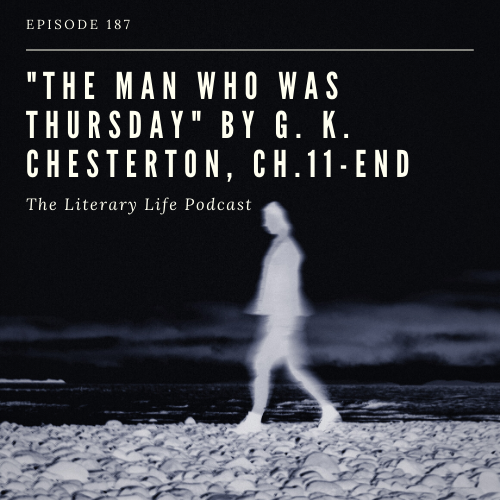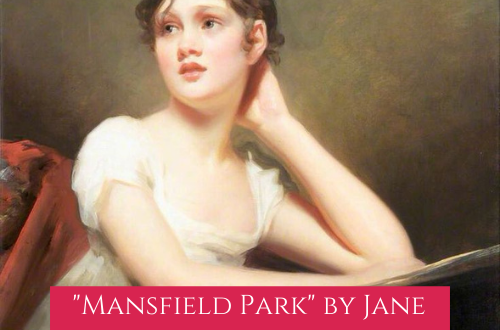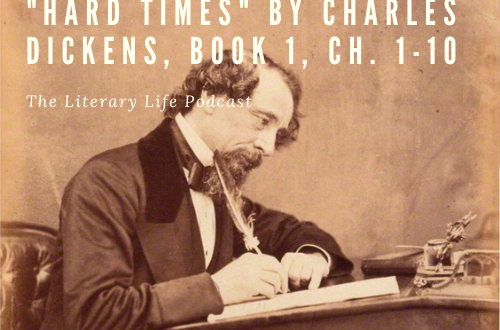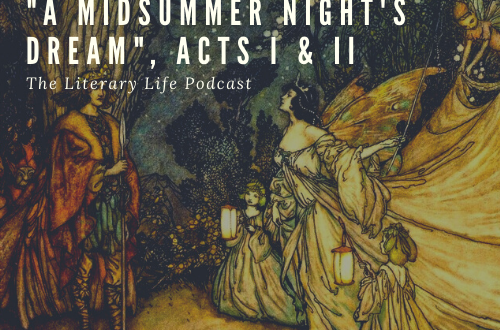
Episode 187: “The Man Who Was Thursday” by G. K. Chesterton, Ch. 11-End
This week on The Literary Life podcast, we wrap up our discussion of The Man Who Was Thursday by G. K. Chesterton. After sharing their commonplace quotes, Angelina, Cindy and Thomas dive right in to the last section and share their various thoughts on finishing this book. Angelina and Thomas talk about some of Chesterton’s thoughts on Impressionism in the arts. Cindy and Thomas make some connections with the old rhyme about “Monday’s Child.” They talk about more of the allegorical elements that are clearly spelled out by Chesterton, as well as many other relations they make to other stories, including the one great story.
Be sure to join us next week when we have a special episode about why translation matters with Dr. Anne Phillips!
Angelina is teaching a class on How to Read Beowulf August 28-September 1, 2023. Get in on this mini-class at House of Humane Letters.
Thomas is also teaching a webinar along with Michael Williams on the modern poets W. H. Auden and T. S. Eliot on September 28th. You can now register at House of Humane Letters.
Listen Now:
Commonplace Quotes:
Almost everywhere and almost invariably the man who has sought a cryptogram in a great masterpiece has been highly exhilarated, logically justified, morally excited, and entirely wrong.
But it is all detail; and detail by itself means madness. The very definition of a lunatic is a man who has taken details out of their real atmosphere.
The truth is, I fear, that madness has a great advantage over sanity. Sanity is always careless. Madness is always careful.
G. K. Chesterton, from The Soul of Wit
Looking for an author’s life in his books is vulgar anyhow, and can be most misleading.
L. P. Hartley, from A Perfect Woman
Perhaps it is not worthwhile to try to kill heresies which so rapidly kill themselves, and the cult of suicide committed suicide some time ago. But it should not wish it supposed as some think I have supposed, that in resisting the heresy of pessimism, I have implied the equally morbid and diseased insanity of optimism. I was not then considering whether anything is really evil but whether is really evil, and in relation to the latter nightmare, it does still seem to me relevant to say that nightmares are not true and that in them even the faces of friends may appear as the faces of fiends. I tried to turn this notion of resistance to a nightmare into a topsy-turvy tale about a man who fancied himself alone among enemies and found that each of the enemies was, in fact, on his own side and in his own solitude.
G. K. Chesterton, on The Man Who Was Thursday
The End of the World
by Dana Gioia
“We're going,” they said, “to the end of the world.” So they stopped the car where the river curled, And we scrambled down beneath the bridge On the gravel track of a narrow ridge. We tramped for miles on a wooded walk Where dog-hobble grew on its twisted stalk. Then we stopped to rest on the pine-needle floor While two ospreys watched from an oak by the shore. We came to a bend, where the river grew wide And green mountains rose on the opposite side. My guides moved back. I stood alone, As the current streaked over smooth flat stone. Shelf by stone shelf the river fell. The white water goosetailed with eddying swell. Faster and louder the current dropped Till it reached a cliff, and the trail stopped. I stood at the edge where the mist ascended, My journey done where the world ended. I looked downstream. There was nothing but sky, The sound of the water, and the water’s reply.
“The End of the World” from Interrogations at Noon. Copyright © 2001 by Dana Gioia. Reprinted for educational purposes only.
Books Mentioned:
The Go-Between by L. P. Hartley
That Hideous Strength by C. S. Lewis
Twelfth Night by William Shakespeare
The Human Beast by Emile Zola
On the Place of Gilbert Chesterton in English Letters by Hilaire Belloc
Napoleon of Notting Hill by G. K. Chesterton
Support The Literary Life:
Become a patron of The Literary Life podcast as part of the “Friends and Fellows Community” on Patreon, and get some amazing bonus content! Thanks for your support!
Connect with Us:
You can find Angelina and Thomas at HouseofHumaneLetters.com, on Instagram @angelinastanford, and on Facebook at https://www.facebook.com/ANGStanford/
Find Cindy at morningtimeformoms.com, on Instagram @cindyordoamoris and on Facebook at https://www.facebook.com/cindyrollins.net/. Check out Cindy’s own Patreon page also!
Follow The Literary Life on Instagram, and jump into our private Facebook group, The Literary Life Discussion Group, and let’s get the book talk going! http://bit.ly/literarylifeFB
Subscribe to The Lit Life:








